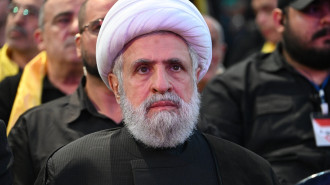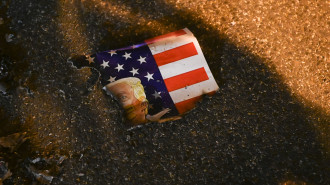
Why Tunisia's fragile democracy is at a crossroads

Early last week, Tunisian President Kais Saied prolonged the emergency measures ordered on 25 July when he began ruling by decree after firing the prime minister, freezing parliament, and lifting the immunity of lawmakers.
Analysts had largely expected the extension after Saied assumed executive authority on 25 July in a shock move that opponents and constitutional lawyers have called a "coup".
The presidency announced the decision late on 23 August, even before Tunisia ended its 30-day emergency period. He justified protracting his measures by attacking parliament the following day.
"We have gone from a state of exception to a state of affairs. We haven't seen a return to the normal running of public institutions, and we don't know where this is heading"
He stated that emergency measures were being extended due to "imminent" danger. "The existing political institutions, as they used to function, are a persistent threat to the state. The parliament itself is a threat to the state," he said in a meeting with the minister of trade.
"President Saied has now made clear that his actions are neither temporary nor tied to any actual national emergency, but simply a power-grab to seize control of the country from its democratically elected institutions," John Hursh, Program Director of Democracy for the Arab World Now (DAWN) said in a press release.
Hursh also stated that by protracting his rule without any timescale for reactivating parliament or nominating a new prime minister, the chief of state is "cementing his executive overreach and further dismantling Tunisia's democracy".
|
|
"One month on, we have gone from a state of exception to a state of affairs. We haven't seen a return to the normal running of public institutions, and we don't know where this is heading," Mouna Kraiem Dridi, professor of constitutional law, commented to The New Arab. "We're in the dark!"
Ahlem Hachicha, a Tunisian political observer, believes it was Saied's intent to extend his authoritarian rule from the beginning of his tenure. The fact that he had continued to refuse participation, even when the Tunisian General Labour Union (UGTT) was calling for national dialogue as the country's political situation deteriorated in late 2020, and has rejected legislative decisions, in her view, indicated such a tendency.
"He's been acting in a way that people get used to this situation little by little. First to the suspension of parliament, then to the idea of not having a government," she said to The New Arab. "The state of exception is there to stay."
How did Saied justify seizing power?
The president consolidated power on 25 July as he dismissed the head of government Hichem Mechichi and suspended parliament for one month by invoking Article 80 of the constitution to seize control of the country, citing special powers.
Though Saied insists that his moves are guaranteed by the constitutional provision, which stipulates that the head of state can take "exceptional measures" in case of an "imminent danger" to national security, some mainstream political parties have decried the actions as a coup against the constitution.
"We have a chief of state who's taking decisions according to popular legitimacy and not the text of the constitution"
The clause also states that the protraction of exceptional measures must be approved after 30 days by a constitutional court. However, Tunisia has yet to establish its constitutional court. The chief of state blocked parliament's bid to form the court earlier this year and blocked constitutional amendments that would limit executive power.
Saied took full charge of the country in response to nationwide protests over the health, economic, and political crises plaguing the North African state.
Following Mechichi's dismissal, Saied swiftly fired top government ministers and replaced senior officials in regional governments, security agencies, and other bodies.
Dridi pointed out that Saied is clearly "at odds with" the other institutions of his government; he is undermining the judiciary and applying his own interpretation of the constitution.
"We have a chief of state who's taking decisions according to popular legitimacy and not the text of the constitution," the law professor said.
Who is resisting Saied in Tunisia?
Several politicians and legal experts have expressed discontent about the state of affairs, suggesting that prolonging the exceptional period means the president's powers are going unchecked.
In particular, the Ennahda party, the biggest bloc in parliament, issued a statement of concern calling for "the resumption of the democratic path", and a "prompt return to the normal functioning of the state institutions", and the "adoption of dialogue as the only way to solve the various problems".
Critics fear the nature of Saied's power grab, and where such an extension may lead, warning that Tunisia, which is often praised as home to the only successful democratic transition in the Arab region, may return to its authoritarian past.
"Since the 2011 revolution, as Tunisia embarked on an uncertain transition to democracy, successive governments have failed to address worsening economic and social woes"
Hachicha argued that Saied has clearly displayed authoritarian tendencies, from presenting himself as the only one capable of interpreting the constitution, to not sharing power, to refusing to meet with key actors.
"He's making decisions based on his personal opinion, there's no balance of power, people are now getting used to freedoms being taken away", the political activist warned, "and it's all indefinite!"
Ridha Belhadj, the former Cabinet director, told Shems FM that the extension was a deviation from the constitution.
"For the first time in the history of Tunisia, a legal and constitutional vacuum has occurred," he said.
The head of state was due to step back within 30 days, the time allowed by the Tunisian constitution for such special measures.
However, Saied has yet to appoint a new prime minister or reveal a roadmap a month after his sudden intervention, despite repeated demands by political parties, unions, and civil society organisations.
What has Saied been doing?
Instead, since his "coup de force", Saied has launched and maintained an "anti-corruption" purge that has seen a number of politicians, judges, and businessmen banned from travelling abroad or put under house arrest, in what critics have denounced as "arbitrary" and "unjustified" measures.
Amnesty International has documented at least 50 cases of people who were barred from travelling over the past month without any judicial authorisation, written order, justification, or timeframe.
"Since his 'coup de force', Saied has launched and maintained an 'anti-corruption' purge that has seen a number of politicians, judges, and businessmen banned from travelling abroad or put under house arrest"
"Tunisian authorities have imposed unlawful and arbitrary travel bans against people in recent weeks without justification and in the absence of any judicial order, in a blatant violation of their right to freedom of movement," said Heba Morayef, Amnesty's Deputy Director for MENA.
The wide-ranging anti-corruption crackdown has sparked mounting concern over freedoms, with many senior state officials, MPs, and civil servants targeted by arrests and travel restrictions.
Do the public support Saied?
The Tunisian president still enjoys widespread popular consensus, given the celebrations that followed his intervention on 25 July, and based on recent polling.
The institutions he has targeted - the government, parliament, and major political parties - are viewed by many Tunisians as corrupt and incompetent.
Saied has also won public support through a successful national vaccination campaign as the country is experiencing an alarming Covid-19 surge.
That said, the Tunisian people anxiously await a new head of government and a roadmap out of the crisis, as the powerful UGTT union and others have asked the president to provide.
Hachicha stressed that the public needs reassurances that Saied has a clear, time-bound plan to get back his country on track.
"He's been building very high expectations, and the disappointment in times of crisis can create a very dangerous situation. He really needs to pay attention to this, show goodwill, and do something," she noted.
Since the 2011 revolution, as Tunisia embarked on an uncertain transition to democracy, successive governments have failed to address worsening economic and social woes which have been exacerbated by Covid-19.
"Saied has been building very high expectations, and disappointment in times of crisis can create a very dangerous situation"
The landslide victory of Kais Saied, a political outsider and retired constitutional law professor, in the 2019 presidential election sparked new hope in a large part of the population, who had lost patience with the inept Tunisian elite and faith in the political system. Many of these constituents have welcomed Saied's seizure of power, seeing him as the man to clean up the system and improve the lives of ordinary citizens.
But since Saied's latest announcement, some voices within Tunisia have cautiously expressed worry with regards to the state of exception being extended, including those who support his vision for the country. More voices are criticising the suspension of rights and freedoms under the current deadlock, observing a lack of impactful actions, and questioning what the president intends to do.
Six national organisations released a statement noting a "series of abuses" that have accompanied the special measures adopted on 25 July, calling for a national debate with the participation of civil society and democratic forces.
|
|
A declared critic of the parliamentary system, Saied appears keen on changing the political system, though how he wants to change it remains unclear.
There is also widespread speculation that he plans to redraw the 2014 democratic constitution, which enshrines the principle of separation of powers and guarantees many fundamental rights and freedoms.
The political crisis in Tunisia also has the potential to aggravate an already struggling economy which contracted by nearly 10% last year. Even before the pandemic, the country was hit by rampant inflation, sluggish growth, high unemployment, and a deterioration in public services.
"We want to see clearly, it's our right, we need to know where we're going," Dridi said, voicing her worries for her country's future.
Alessandra Bajec is a freelance journalist currently based in Tunis.
Follow her on Twitter: @AlessandraBajec
![Tunisian security forces stands guard outside parliament headquarters in Tunis on 31 July, 2021. [Getty]](/sites/default/files/styles/medium_16_9/public/2021-08/GettyImages-1234346710.jpg?h=199d8c1f&itok=a0hgo8O7)
![A Tunisian protester lifts a national flag at an anti-government rally as security forces block off the road in front of the Parliament in the capital Tunis on 25 July, 2021. [Getty]](/sites/default/files/styles/medium_16_9/public/2021-08/GettyImages-1234182036.jpg?h=16f2671a&itok=y3shDHX3)




 Follow the Middle East's top stories in English at The New Arab on Google News
Follow the Middle East's top stories in English at The New Arab on Google News


